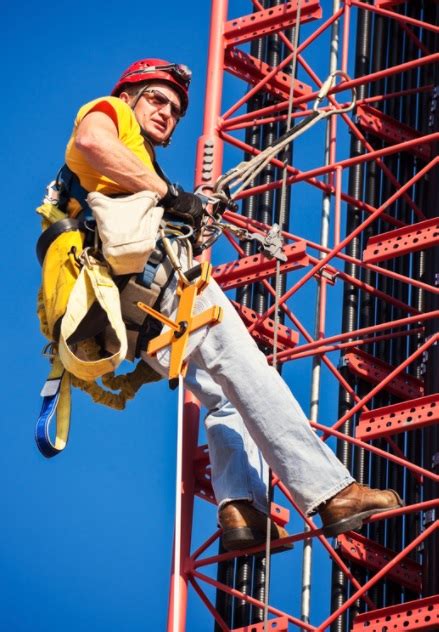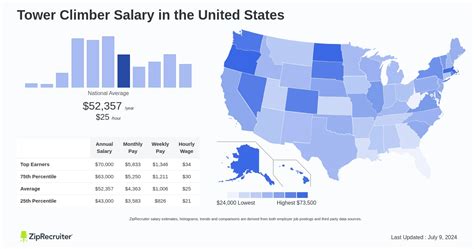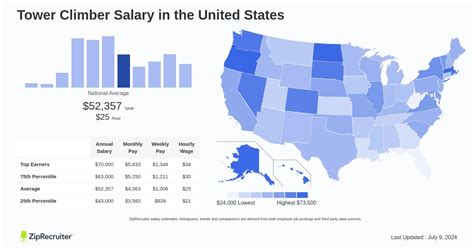For those who seek a career that breaks the mold of a traditional office job, the role of a tower climber offers a unique blend of technical skill, physical challenge, and breathtaking views. But beyond the adrenaline and adventure lies a crucial question for any prospective professional: What is the earning potential? A career as a tower climber is not only demanding but can also be financially rewarding, with average salaries often ranging from $55,000 to over $85,000 annually, depending on a variety of key factors.
This guide will provide a comprehensive breakdown of a tower climber's salary, explore the factors that influence it, and examine the future outlook for this critical profession.
What Does a Tower Climber Do?

A tower climber, also known as a tower technician, is a specialized professional responsible for the installation, maintenance, and repair of equipment on communications towers. Their "office" can be anywhere from 100 to 2,000 feet in the air.
Key responsibilities include:
- Installing and testing cellular antennas, 5G equipment, broadcast systems (TV/radio), and microwave dishes.
- Performing routine maintenance and inspections to ensure structural integrity and equipment functionality.
- Troubleshooting and repairing faulty components to restore service.
- Running and securing transmission lines, such as coaxial and fiber-optic cables.
- Adhering to strict safety protocols at all times, as safety is the most critical aspect of the job.
It is a physically demanding role that requires a high level of technical aptitude, a strong focus on safety, and a complete lack of fear of heights.
Average Tower Climber Salary

While salaries can vary significantly, we can establish a reliable baseline by looking at data from government agencies and leading salary aggregators.
According to the U.S. Bureau of Labor Statistics (BLS), the most relevant category for this role is "Telecommunications Equipment Installers and Repairers." The BLS reports the following data as of May 2022:
- Median Annual Wage: $64,370
- Lowest 10% Earned: Less than $38,570
- Highest 10% Earned: More than $91,480
Data from professional salary websites provides a similar picture, often reflecting the inclusion of overtime and per diem payments:
- Salary.com reports the average Tower Climber salary in the United States is around $65,580, with a typical range falling between $56,698 and $75,342.
- Payscale notes an average base salary of approximately $25 per hour, which translates to an annual salary of about $52,000 before overtime, with experienced technicians earning significantly more.
- Glassdoor often reports a total pay average near $68,000 to $72,000 per year, which includes base salary and additional compensation like bonuses and profit-sharing.
A practical salary progression looks like this:
- Entry-Level (Tower Tech I): $45,000 - $55,000
- Experienced (Tower Tech II/III): $55,000 - $75,000
- Senior/Foreman: $75,000 - $95,000+
Key Factors That Influence Salary

Your specific salary as a tower climber will be determined by a combination of factors. Understanding these can help you maximize your earning potential throughout your career.
### Level of Education and Certification
A four-year college degree is not required to become a tower climber. Most employers look for a high school diploma or equivalent. However, what truly drives value and pay are industry certifications. These are often mandatory for employment and signal a commitment to safety and skill. Key certifications include:
- NWSA TTT-1 & TTT-2: The National Wireless Safety Alliance (NWSA) Telecommunications Tower Technician certifications are the industry standard. Progressing from TTT-1 to TTT-2 demonstrates advanced skill and opens the door to higher-paying roles.
- OSHA 10/30: Certifications from the Occupational Safety and Health Administration are essential for understanding job site safety.
- First Aid/CPR/AED: Basic life-saving skills are non-negotiable.
- RF Awareness: This certification is crucial for working safely around radio frequency emissions.
While education isn't a primary factor, holding these certifications is a direct lever for increasing your salary.
### Years of Experience
Experience is one of the most significant factors in a tower climber's compensation. The industry has a clear career ladder, with pay increasing at each rung.
- Entry-Level (0-2 years): Often called a "greenhand" or Tower Tech I, newcomers spend their time learning from senior technicians, assisting with basic tasks, and focusing heavily on safety. Pay is at the lower end of the spectrum.
- Mid-Level (2-5 years): A Tower Tech II or III has a solid foundation of experience. They can work more independently, troubleshoot common issues, and may begin leading small teams on less complex jobs. This is where salaries see a substantial jump.
- Senior/Lead (5+ years): A Tower Foreman or Lead Technician is a seasoned expert. They are responsible for managing entire crews, overseeing complex installations and repairs, ensuring site safety, and interfacing with clients. These professionals command the highest salaries in the field.
### Geographic Location
Where you work matters. Salaries are often adjusted based on the cost of living and regional demand for skilled technicians.
- High Cost of Living Areas: States like California, New York, New Jersey, and Massachusetts tend to offer higher base salaries to compensate for the higher cost of living.
- High Demand Areas: States with major metropolitan centers or those undergoing significant rural broadband expansion (like Texas and Florida) have a constant need for tower crews, driving competitive wages.
- Travel and Per Diem: Many tower climbers travel extensively for work. Companies often provide a "per diem"—a daily allowance for food and lodging—which can significantly supplement take-home pay, although it is not part of the base salary.
### Company Type
The type of company you work for can have a major impact on your pay and benefits package.
- Major Wireless Carriers: Companies like AT&T, Verizon, and T-Mobile directly employ some technicians. These roles typically come with excellent salaries, comprehensive benefits, and a strong, top-down safety culture.
- Tower Owners: Companies like American Tower and Crown Castle own and lease tower infrastructure. They hire climbers for maintenance and upgrades, and generally offer competitive pay and stable employment.
- Contracting Companies (TURF Vendors): The majority of tower climbers work for contractors who are hired by the major carriers and tower owners to perform the hands-on work. Salaries at these companies can vary widely. Larger, established contractors often offer excellent pay and benefits, while smaller outfits might be more variable. Researching a contractor's reputation is crucial.
### Area of Specialization
Just as in other technical fields, specialization can lead to higher pay. While most climbers work on cellular equipment, those with niche skills are in high demand.
- Cellular (4G/5G): This is the most common area of work due to the constant need for network upgrades and expansion.
- Microwave Systems: Installing and aligning microwave dishes is a more complex, precision-oriented skill that often commands higher pay.
- Broadcast (TV/Radio): Working on tall broadcast towers is a highly specialized and often lucrative niche.
- Fiber Optics and PIM/DAS Testing: Technicians who are certified in fiber optic installation or specialized testing like Passive Intermodulation (PIM) and Distributed Antenna Systems (DAS) are extremely valuable and can earn a premium.
Job Outlook

The future for tower climbers appears stable and essential. The BLS projects that employment for telecommunications equipment installers and repairers will grow by 2% from 2022 to 2032.
While this growth rate is slower than the average for all occupations, it does not tell the whole story. The demand for data is ever-increasing, and the rollout of 5G technology is a massive, multi-year undertaking that requires a skilled workforce. Furthermore, existing infrastructure constantly needs maintenance, repair, and eventual decommissioning. This creates a steady stream of work, and due to the demanding nature of the job, there is consistent turnover, leading to frequent openings for qualified technicians.
Conclusion

A career as a tower climber offers a direct path to a competitive and rewarding salary without the need for a traditional four-year degree. While the work is challenging, the financial rewards are significant for those who are dedicated and safety-conscious.
Your earning potential is firmly in your hands. By focusing on these key takeaways, you can build a successful and lucrative career:
- Prioritize Safety and Certification: This is the foundation of your career and your value.
- Embrace Experience: Each year in the field builds your expertise and your paycheck.
- Pursue Specializations: Develop niche skills in areas like microwave or fiber optics to become a top earner.
- Choose Your Employer Wisely: Research companies to find one that aligns with your career goals and offers competitive compensation.
For the right individual, climbing towers is more than a job—it's a high-stakes, high-reward career with a view that can't be beaten.
